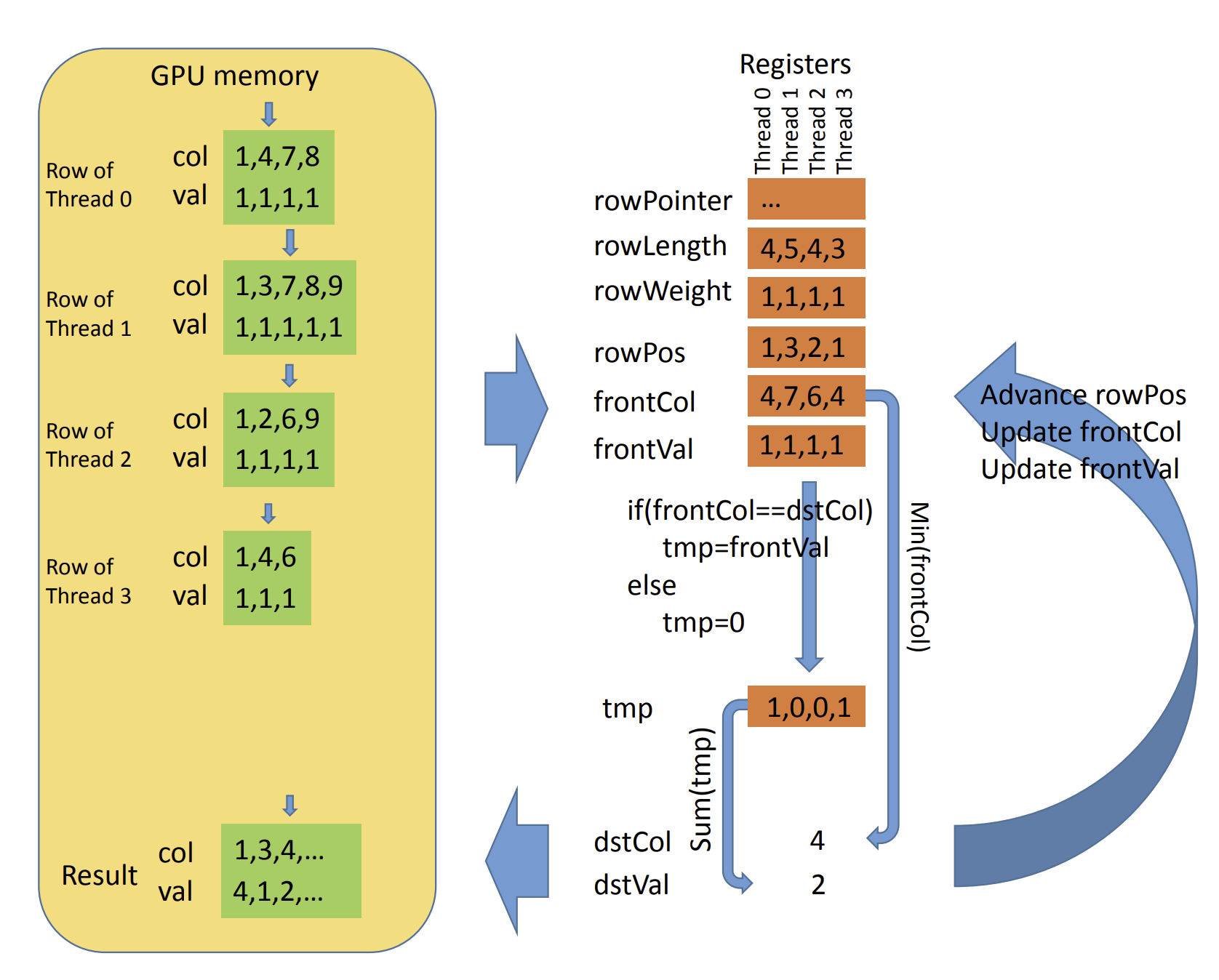Sparse matrix multiplication on polymorphic semiring with NVIDIA CUDA backend implemented with AnyDSL Artic
The algorithm splts the left matrix operand into submatricies that contain no more than warp_size elements per row. Each warp then multiplies its own row by every row of the right operand. Inspired by GPU-Accelerated Sparse Matrix-Matrix Multiplication by Iterative Row Merging
.
├── artic # Artic AnyDSL frontend code for sparse spgemm
| ├── sparse.art # all the code for it, `main` function contains APSP example
| ├── ...
├── build # convenient directory to place build files
├── cpp # CUDA and Impala implementation with exported wrappers to help Artic
| ├── test_matrix_market.cpp # playground file with APSP example
| ├── ...
├── include # include headers
│ ├── csr_wrapper.h # C++ wrappers for csr operations, containing CUDA, Impala, CUSPARSE, Suitesparse, IntelMKL spGEMMs
├── matrix_data # test data in `matrix_market` format
├── matrix_reader # `matrix_market` reader submodule
├── test # test folder
├── int_converter.py # script to convert `integer` matrix_market to `real`
└── README.md # this README
spGEMM multiplies two sparse matricies with A and B being the left and right operands repsectively. The result of mxm multiplication is a matrix which i-th row is a linear combination of the all the rows of the right operand with elements of the i-th row of the left operand. Given that, the algorithm first precomputes the upper bound of non-zero values of the result. In general, i-th CUDA warp operates with i-th row of the left operand (i.e. each row should contain less than non-zero 32 elements, this restriction could be satisfied by spliting a single spGEMM into a chain of such multipication where left operand satisfies the restriction). preproseccRows function calculates the length of each prospective row of the resulting matrix, populating csr_offsets device array with is then gets prefix-summed with thrust. The multiplication itsellf is performed in a similar way. The illustation could be seen in the figure which has been taken from the paper.
struct CSR [T] {
N : u32, //cols
M : u32, //rows
nnz : u32, //number of nonzero elements
values : &mut[T], //row-major
cols : &mut[u32],
row_index : &mut[u32]
}
struct Semiring [T] {
zero : T,
one : T,
plus : fn(T,T) -> T,
multiply : fn(T,T) -> T
}
...
#[export]
fn main() -> i32{
let csrA = read_csr_f32("/home/alexey.tyurin/specialization/impala-worksheet/sparse/matrix_data/apsp/input");
let s_mult_plus = Semiring[f32] {zero = 0.0:f32, one = 1.0:f32, plus = |x,y| x + y, multiply = |x,y| x * y };
let inf = 1111111111111111111111111111111111111111111111111111111.0:f32; // this overflows to infinity;
// MIN + semiring could be composed of first-class functions
let s_min_plus = Semiring[f32] {zero = inf, one = 1.0:f32, plus = |x, y| if x <= y {x} else {y}, multiply = |x,y| x + y};
//apsp body
let m = csrA.M as i32;
let mut i = 1;
let mut res : &CSR[f32] = &csrA;
while(i < m - 1) {
let res_squared = spGEMM[f32](res,res,s_min_plus); //spGEMM is computed on the GPU
release_csr_Host[f32](res);
res = &res_squared;
i = i + 1;
}
print_csr_f32(res);
release_csr_Host[f32](res);
0
}Currently the type for matrix entries should be straightfuly understood by
cuda_memcpyand be available inCUDAas well. So arbitrary structure could be used as long as it conforms tomemcpysemantics and has a corresponingcsrreader to represent a matrix with such entries.
Works on Ubuntu 20.04, and
CMAKEfiles could give a brief idea about the dependencies needed.
